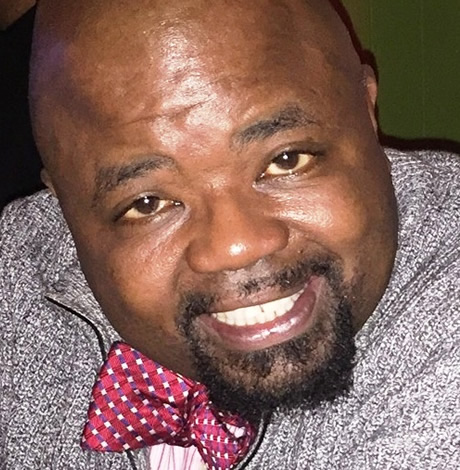Sports
Trans swimmer: ‘Why fight them when you can lead them’
Natalie Fahey on thriving in the NCAA
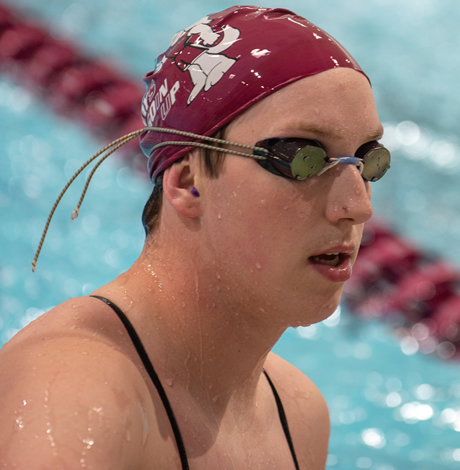
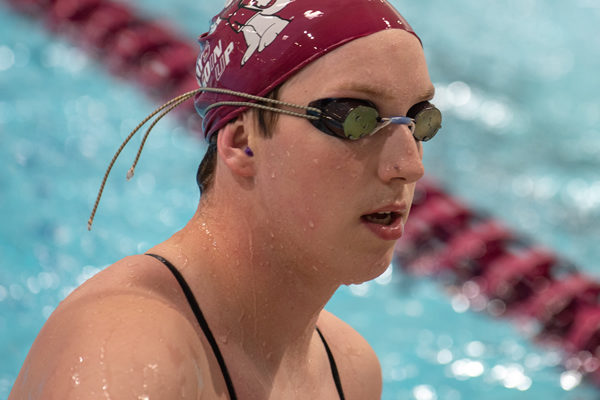
Two weeks before the start of the 2018 Mid-American Conference Men’s Swimming & Diving Championships, Natalie Fahey began taking hormones. It was her junior year at Southern Illinois University, and she was cutting it close to the championships so it wouldn’t affect her performance on the men’s swim team.
“Overall I was pretty happy with the way I swam, but I had a moment at the end of the conference meet. I knew I would never swim that fast again. It was bittersweet,” says Fahey. “I began to feel trepidation because I didn’t know what was coming next.”
What ended up coming next was Fahey’s transition and her becoming the first male to female swimmer to compete on an NCAA Division 1 team. It was a process that was supported by her teammates and her coach, Rick Walker.
Growing up in Waukesha, Wisc., Fahey was active in football, soccer, baseball and swimming. In her freshman year of high school, she was a starting right guard on the football team and ended up joining the cross-country team to compliment her swimming.
She made the varsity swim team her sophomore year and podiumed every year at the state swimming championships. She also went to the state championships in cross country.
“I really thought I was hot shit in high school,” Fahey says.
In the middle of her sports accomplishments, little things were popping up – indicators that would evolve over the next few years.
“I identified as a cis guy and my outlook was that I was going to question it, but not explore. I didn’t know what was happening,” says Fahey. “There was ongoing depression, but swimming kept me busy. It was my coping mechanism.”
Fahey flourished in the men’s swimming program under Coach Walker in her freshman year and dropped eight seconds in her 500 freestyle.
“It is a fantastic program and I started to see the fruits of my labor,” Fahey says. “I was working on every aspect of swimming and I was totally in love with all of it.”
One constant that accompanied her achievements in the pool were thoughts of transitioning. By her sophomore year, she began researching the NCAA rules on transgender athletes.
“There were so many variables to think about. I wanted to keep swimming, but I struggled to accept that I would get slower if I started taking hormones. It was also going to be very public,” says Fahey. “My swimming career was incongruent with transitioning. I kept wondering where I could squeeze in a year.”
The summer before her junior year, she painted her toenails for the first time and began asking friends to use she/her/hers pronouns. That fall, she spent a weekend with her parents in St. Louis before college move-in day and had a big announcement for them after a few beers at a local brewery.
“The words just came out – I’m trans, I’m a girl,” Fahey says. “They didn’t disown me, but it was uncomfortable. I did not go about it in a healthy way.”
Back in the pool for her junior year, Fahey tweaked her shoulder at a home meet before Thanksgiving. The injury only allowed for kicking during her swim training. For the first time, she had serious thoughts of quitting so she could begin transitioning.
“I pushed those thoughts back to the dark recesses of my mind,” says Fahey. “By Christmas break I decided to tell my coach; I want to transition, and I want to keep swimming.”
Coach Rick Walker assured Fahey that she wasn’t recruited for her times but for who she is as a person. Her spot on the men’s team was confirmed for her senior year.
That summer before her final year of NCAA eligibility, she started an internship in Indianapolis as an RV technician at a dealership and began experimenting with presenting as female.
“An RV dealership in Indiana isn’t the most comfortable place to present as a trans woman. There were shouts from cars – ‘You’re still a dude’,” Fahey says. “I am pretty thick-skinned and didn’t let it hit me hard.”
Fahey showed up for her senior year on the men’s team after six months of estrogen. She was out of shape, overweight and had lost a lot of strength from the hormones. She was competing on the men’s team in a women’s suit because of breast development.
“I swam slow at our first swim meet and went home and cried. I battled all season with not comparing myself to my previous self,” says Fahey. “It was a tough pill to swallow knowing I was never going to improve again.”
Fahey began focusing on other small victories – that feeling after a great workout, the team atmosphere, community events with her teammates and mentoring the incoming class of swimmers. She was able to rediscover her love for the sport of swimming.
Throughout the regular season, Fahey was competing with the men. At 6’2” tall, in a women’s suit, she was still showing male traits. She says she didn’t hear anything but positive remarks from teammates or opposing teams.
There was still one thing on her mind that she wanted to achieve before she completed her collegiate career.
“I had a lot of self-pride in the fact that I stuck through all the adversity and didn’t quit the sport that I love,” Fahey says. “Competing in just one meet on the women’s team would be a personal victory.”
After many discussions with her coach, it was decided that Fahey would compete at the 2019 Missouri Valley Conference Swimming and Diving Championships on the women’s team. Even though it would have been legal for her to score points (she had completed 12 months of estrogen), Fahey was entered as an exhibition swimmer.
“We decided that doing it that way would be the best course. It would have been a fight and I would have been called a cheater. Why fight them when you can lead them,” says Fahey. “I feel like I did a good job of introducing the NCAA to trans female swimming.”
Fahey is still living in Carbondale and has one semester left at Southern Illinois University. She has switched her major from mechanical engineering to automotive technology. Her dream is to work at a major automaker in serviceability.
After 15 months of hormones, she is engrossed in the female lifestyle and out to everyone in her life. She wants to have as little surgery as possible and is having consultations while she is still a student. Her student insurance at Southern Illinois is comprehensive and will cover medical procedures.
“I can’t tell you how many times I have thought back to where I was five years ago. Where I am at right now is amazing. My friends, girlfriend and family are all fantastic. I have very few complaints,” Fahey says. “I have tried to be outspoken because I feel like I owe it to the community to be a proponent for trans rights.”
Recently Fahey became scuba certified. During her dives down to submerged shipwrecks, she has begun scrawling ‘Trans Rights’ on every structure.
“I’m just doing my small part,” she says laughing.
Sports
Brittney Griner, wife expecting first child
WNBA star released from Russian gulag in December 2022

One year after returning to the WNBA after her release from a Russian gulag and declaring, “I’m never playing overseas again,” Phoenix Mercury star Brittney Griner and her wife announced they have something even bigger coming up this summer.
Cherelle, 31, and Brittney, 33, are expecting their first child in July. The couple shared the news with their 715,000 followers on Instagram.
“Can’t believe we’re less than three months away from meeting our favorite human being,” the caption read, with the hashtag, #BabyGrinerComingSoon and #July2024.
Griner returned to the U.S. in December 2022 in a prisoner swap, more than nine months after being arrested in Moscow for possession of vape cartridges containing prescription cannabis.
In April 2023, at her first news conference following her release, the two-time Olympic gold medalist made only one exception to her vow to never play overseas again: To return to the Summer Olympic Games, which will be played in Paris starting in July, the same month “Baby Griner” is due. “The only time I would want to would be to represent the USA,” she said last year.
Given that the unrestricted free agent is on the roster of both Team USA and her WNBA team, it’s not immediately clear where Griner will be when their first child arrives.
The Griners purchased their “forever home” in Phoenix just last year.
“Phoenix is home,” Griner said at the Mercury’s end-of-season media day, according to ESPN. “Me and my wife literally just got a place. This is it.”
As the Los Angeles Blade reported last December, Griner is working with Good Morning America anchor Robin Roberts — like Griner, a married lesbian — on an ESPN television documentary as well as a television series for ABC about her life story. Cherelle is executive producer of these projects.
Next month, Griner’s tell-all memoir of her Russian incarceration will be published by Penguin Random House. It’s titled “Coming Home” and the hardcover hits bookstores on May 7.
Sports
Applause and criticism for Staley’s trans-inclusive stance
South Carolina Gamecocks women’s coach made comments on Sunday
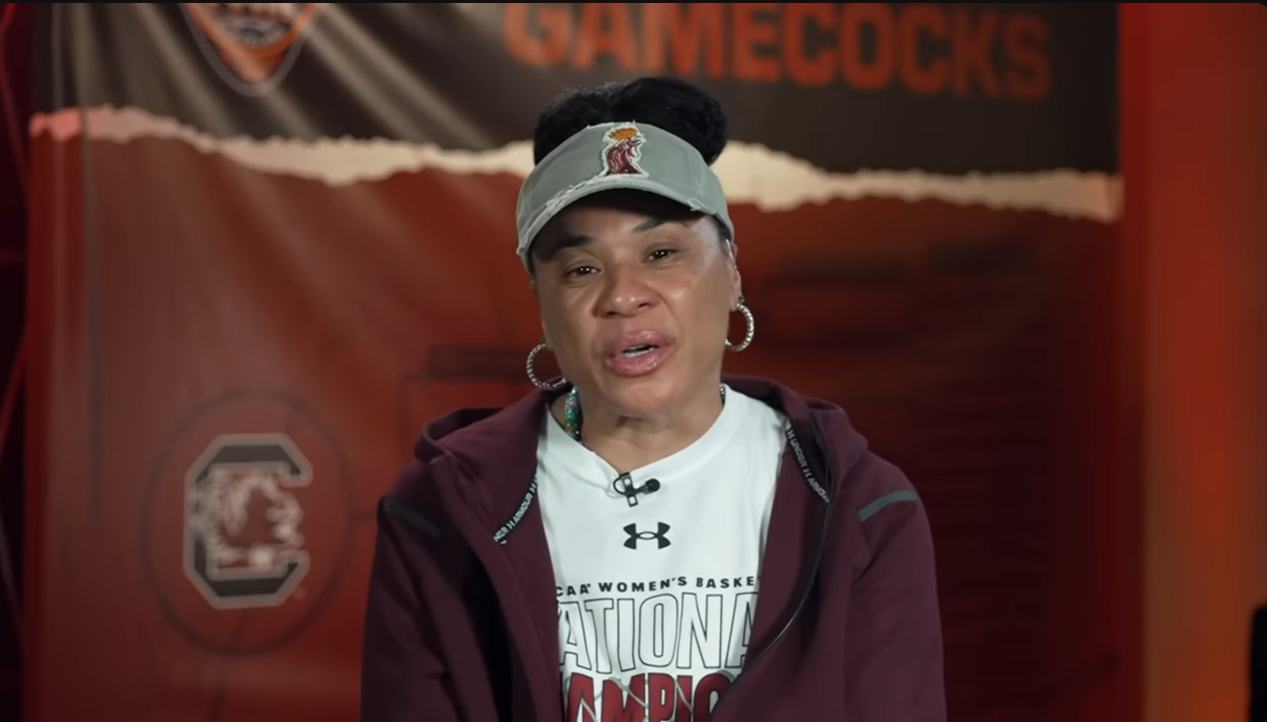
If not for a conservative transphobic blogger, this moment should be a celebration of NCAA women’s basketball coach Dawn Staley and the women of the South Carolina Gamecocks.
On Sunday, they concluded their undefeated season with a decisive win and a championship title. But when Staley faced reporters before that big game, Outkick’s Dan Zakheske asked her an irrelevant, clickbait question about transgender women in sports, referring to them as “biological males.”
Staley could have ignored the question, or stated she had no opinion, but instead the legendary coach offered a crystal clear endorsement of trans women competing in women’s sports, something outlawed in her home state of South Carolina for girls in kindergarten through college.
“I’m of the opinion,” said Staley, “If you’re a woman, you should play. If you consider yourself a woman and you want to play sports or vice versa, you should be able to play. That’s my opinion.”
Zakheske clearly wasn’t satisfied with that declaration of allyship and Staley swiftly cut him off.
“You want me to go deeper?” she asked.
“Do you think transgender women should be able to participate,” he started to say, when the coach stole the ball and took it downtown on a fastbreak. “That’s the question you want to ask? I’ll give you that. Yes. Yes. So, now the barnstormer people are going to flood my timeline and be a distraction to me on one of the biggest days of our game, and I’m okay with that. I really am.”
Staley is herself a Hall of Fame player a leading voice for diversity.
Reaction to her comments were swift, from LGBTQ rights organizations, athletes and inclusion opponents.
“Coach Staley simply spoke the truth that trans women are women and should play if they want,” said Sarah Kate Ellis, president and CEO of GLAAD, in a post on Instagram. “All of us can take a page from Coach Staley’s playbook as a sports leader and as a person of high integrity guided by faith, compassion and common sense.”
A White House pool reporter revealed President Joe Biden called Staley Sunday evening to congratulate her and the Gamecocks on their championship win. But it’s not clear if she and the president, an outspoken supporter of trans rights, discussed her remarks on trans athletes.
A number of Black leaders in the LGBTQ movement applauded Staley for taking a stand.
“Coach Staley has always been a trailblazer, but she’s also shown that true leadership is about advancing justice and equality for everyone,” said Human Rights Campaign President Kelley Robinson. “By expressing her full-throated support for transgender athletes’ inclusion in sports, she’s sending an important message — our shared humanity matters.
“Coach Staley showed courage and vulnerability, in choosing to answer the question and make a powerful statement of support for trans people on one of the biggest days and biggest stages in sports history,” said Kierra Johnson, executive director of the National LGBTQ Task Force, in a statement. “Not only does that make her a leader we can all aspire to like, it makes her a class act. She has etched her legacy in the history books with her play, her coaching, her heart and her smarts.”
In congratulating Staley on her championship title victory, Dr. David J. Johns, the CEO and executive director of the National Black Justice Coalition, also commended her for “her unwavering advocacy and support for transgender people in sports.”
“In a time when transgender athetes face unjust scrutiny, discrimination and exclusion from the National Association of Intercollegiate Athletics, her courage to speak truth to power and in support of inclusion and fairness sets a powerful example for us all, and is a testament to her integrity and compassion.”
The NBJC leader was referring to Monday’s announcement by the NAIA, the governing body of athletic programs at small colleges nationwide, voting 20-0 to essentially ban trans women from competing with other women beginning Aug. 1, as ESPN reported.
“It is a shocking and devastating development that the NAIA, an organization that has done so much to open doors, is now slamming those doors shut on transgender athletes,” said Sasha Buchert, Lambda Legal’s senior attorney and director of the organization’s nonbinary and trans rights project.
“Instead of standing up in support of transgender young people, the NAIA has simply turned its back on them — permanently depriving them of the benefits of competition. Would that they had the courage of victorious University of South Carolina women’s basketball coach Dawn Staley, who didn’t miss a beat in clarifying that transgender women should be able to play.”
However, praise for Staley’s stance was not universal.
Riley Gaines, failed former college swimmer and paid shill for the anti-inclusion organization, Independent Women’s Forum, called Staley “entirely incompetent or a sell-out” on Fox News. “Personally, I don’t think she believes what she said.”
Gaines has turned her fifth-place tie with out trans NCAA champion Lia Thomas into a career as a crusader against inclusion and a former advisor to the presidential campaign of Florida Gov. Ron DeSantis.
Val Whiting, a former Stanford University and professional women’s basketball player, tweeted her strong disagreement with Staley. “A lot of my basketball sisters feel differently but trans women do not belong in women’s sports. It’s not fair nor safe for biological women. There has to be another solution for trans women to be able to compete athletically besides having them compete against biological women.”
A lot of my basketball sisters feel differently but trans women do not belong in women’s sports. It’s not fair nor safe for biological women. There has to be another solution for trans women to be able to compete athletically besides having them compete against biological women.
— Val Whiting (@iamcoachval) April 7, 2024
Zaksheske’s Outkick colleague, anti-trans pundit David Hookstead, also went all-in with a transphobic post.
“Dawn Staley says she supports men who identify as women competing against real women in sports. Her view could literally destroy women’s basketball forever. Why won’t more people stand up for women?”
Dawn Staley says she supports men who identify as women competing against real women in sports.
— David Hookstead (@dhookstead) April 6, 2024
Her view could literally destroy women’s basketball forever.
Why won’t more people stand up for women? pic.twitter.com/2A59KTqvHb
Hookstead then boasted that Staley blocked his account.
Republican South Carolina Congresswoman Nancy Mace retweeted Zaksheske’s account of his interaction with Staley, calling her support of trans athletes “absolute lunacy.” That in turn won praise from Caitlyn Jenner, who retweeted Whiting and posted her thanks to Mace, along with this comment: “There is nothing complicated about this issue!”
What is complicated is that Jenner has never explained why she has competed with cisgender women in golf ever since her transition almost a decade ago.
You’re a hypocrite. pic.twitter.com/42DKwA9jmF
— Art Candee 🍿🥤 (@ArtCandee) April 7, 2024
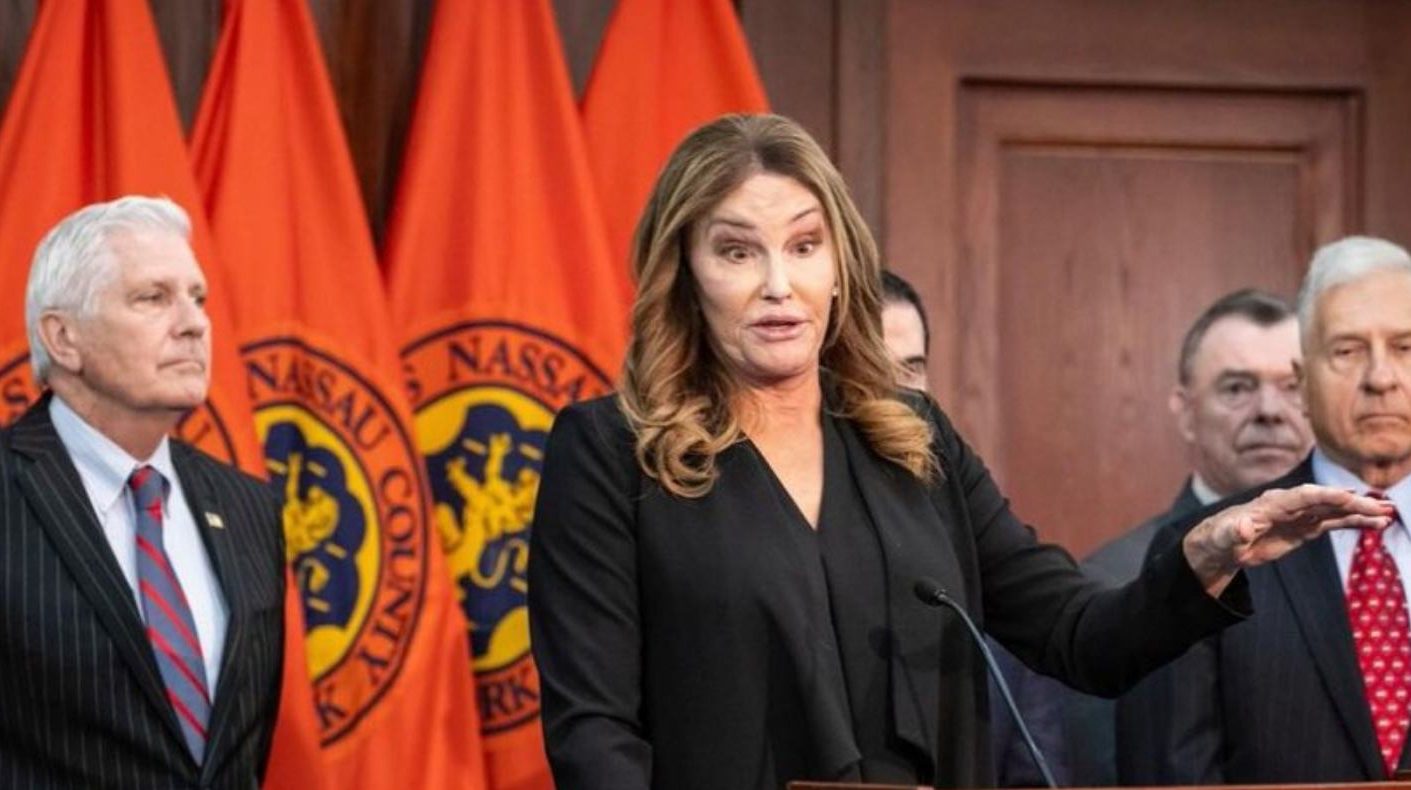
Caitlyn Jenner flew from Malibu to New York this week to join her fellow Republicans in their nationwide quest to keep transgender girls and women from competing in sports with other women.
“Let’s stop it now while we can,” said the Olympic gold medalist, at a news conference carried live by Fox News Channel.
Republican Nassau County Executive Bruce Blakeman organized the event so that Jenner could speak in support of his February executive order banning trans athletes at more than 100 county-owned facilities.
“Trans women are competing against women, taking valuable opportunities for the long-protected class under Title IX and causing physical harm,” said Jenner without providing supportive evidence of her claim. Jenner said the ban would defeat “the woke agenda.”
Her comments drew praise from former NCAA swimmer and paid shill Riley Gaines, who represents the Independent Women’s Forum and has also worked with the failed presidential campaign of Republican Gov. Ron DeSantis of Florida on his anti-trans athlete platform.
We stand with Executive Blakeman as he faces shameful retaliation from @TishJames for merely protecting sports on the basis of sex
— Riley Gaines (@Riley_Gaines_) March 18, 2024
Thanks to you both, @Caitlyn_Jenner @NassauExec !!👏🏼 https://t.co/vAsWfayI7l
“If the left wants to fight this battle on this hill, it’s a losing battle,” said Jenner. “We will win the battle.” She claimed she spoke on behalf of women and girls, contradicting her past statements in support of trans girls competing according to their gender identity and despite the fact she herself still competes in women’s sports.
Shortly after the ban was announced last month, New York State Attorney General Letitia James and New York Gov. Kathy Hochul, both Democrats, denounced it and accused Blakeman of “bullying trans kids.”
James called the order “transphobic and deeply dangerous,” and argued that it violates the state’s anti-discrimination laws. The state attorney general challenged it in court March 1 with a “cease and desist letter,” demanding that Blakeman rescind the order, saying it subjects women’s and girls’ sports teams to “invasive questioning.”
As the Los Angeles Blade reported, Blakeman’s legal team countered with its own lawsuit on March 5, claiming her cease and desist letter violates the 14th Amendment’s equal protection clause.
“Not only was the executive order legal, but we had an obligation to defend it,” Blakeman said Monday.
The order has also been challenged by the New York Civil Liberties Union, which filed suit last week on behalf of a women’s roller derby league based in Nassau County that welcomes trans women and would be barred from using the county’s facilities by Blakeman’s executive order.
Just days before the Long Island news conference, Jenner joined Olympian Sharron Davies, who also campaigns against trans inclusion in sports, for an conversation with a British newspaper, the Telegraph, which has been outspoken against trans inclusion.
They recalled that in their day, tests to determine sex were mandatory in order to compete, and Jenner said she has been “pushing” for sex tests to return to sports, decades after sports organizations around the world abandoned the practice because they were unreliable. “If they continue down this road, it will be pretty much the end of women’s sport as we know it.”
“I can still hit a golf ball 280 yards,” Jenner continued, not mentioning she plays from the ladies’ tee. She did however opine about not being “a real woman,” acknowledging that many trans women disagree with her view.
“They keep saying, ‘Oh, I’m a real woman, I’m a real woman,’ and I’m going, ‘No, you’re not,’” said Jenner. “I will use your preferred pronouns, I will treat you as a female, you can run and dress and do whatever you want, I have nothing against that, it’s fine, but biologically you’re still male.”
She added: “Let me explain — I am biologically male, OK? I’m XY. There’s nothing I can do to change that. If you believe in gender dysphoria, and I think most people do realize it’s not a disease, it’s a mental condition, just like some people are left-handed and some people are right-handed, it’s kind of the way you’re born and I’ve dealt with it my entire life.“
“I consider myself a trans person, I am still genetically male, I changed all of my ID right down to my birth certificate so technically yes, I am female, but on the other hand I know I’m not.”
Related:
-

 Africa3 days ago
Africa3 days agoCongolese lawmaker introduces anti-homosexuality bill
-

 World3 days ago
World3 days agoOut in the World: LGBTQ news from Europe and Asia
-

 Kansas5 days ago
Kansas5 days agoKansas governor vetoes ban on health care for transgender youth
-

 District of Columbia3 days ago
District of Columbia3 days agoReenactment of first gay rights picket at White House set for April 17

